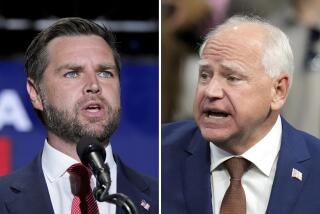Shake up the debates
- Share via
There was some consternation when the moderators for the presidential debates were announced and we learned that Jim Lehrer, Tom Brokaw and Bob Schieffer would referee. For Lehrer -- who will host the first debate Friday, if it goes forward -- this will be his 11th appearance. Brokaw has covered presidential elections since 1976, and Schieffer has been reporting in Washington since 1970.
Though I didn’t share it, the fear was that white, senior males would be deferential to a white, senior candidate they’ve known for decades. I believe that Lehrer, Brokaw and Schieffer will make every effort to be evenhanded. But even if they tilt the playing field, it won’t matter -- the campaigns and the Commission on Presidential Debates have just tweaked the format so the candidates can directly confront each other. In the process, it would seem that the moderators have been reduced to mere timekeepers.
Before negotiations with the campaigns began, the plan was for the two formal debates (the third is a “town hall” format) to focus on nine questions, with nine minutes devoted to each. Now, each topic will still be allotted nine minutes -- but not for focused debate. Instead, the candidates will begin each response with a two-minute statement, which, freely translated, means two minutes from their stump speeches. That leaves only five minutes for discussion of any topic -- just long enough to offer the merest start of an exploration of complex issues such as, for example, conflicting explanations for the success of the military “surge” in Baghdad.
The Commission on Presidential Debates called these rules “a breakthrough in the history of televised debates.” And the commission and the political parties speak of these craven modifications as if the public interest were their overriding concern. But to do well, a candidate need only memorize enough statistics and one-liners to fill 45 minutes -- essentially what many college students do at exam time. No wonder these debates are likely to disappoint politically aware viewers and fail to enlighten those who watch out of a sense of duty.
It’s a pity. Just a few changes in format could transform these unrevealing, visually static and technologically backward shows into genuine must-see TV.
Use the medium. This is the Super Bowl of politics -- or at least the playoffs -- so open as if it were the start of a great sports event. As the broadcast begins, show a montage of the candidates preparing, relaxing, joking with their inner circles, having makeup applied. Then go live in their dressing rooms, with the candidates in shirt sleeves. Have Steadicam-enabled sports crews lead them onto the stage -- there’s instant tension.
Follow through. When candidates know they won’t be asked follow-up questions, well, they can say anything, can’t they? In the past, moderators have rolled through questions as if their sole responsibility was to get to the bottom of a checklist. But if a question is important enough to be asked, a moderator should stay with it until it’s answered. Who decides that? The audience. Install keypad voting devices at every seat so the good citizens in the studio audience can signal when they are satisfied that a candidate has answered the question. And honor that vote; freeze the debate on one issue until a majority is ready to move on.
Teach painlessly. Let’s not pretend that viewers have followed politics, economics and war as closely as professional journalists and news junkies -- a third of our citizens still believes that Saddam Hussein was personally involved in the 9/11 attacks. Use the video screens to showcase incontrovertible facts: “The U.S. national debt is now equivalent to about 65% of the nation’s gross domestic product.” Then have the candidates discuss: “What does that mean to you? To your kids? What would you do about it?”
Fact check. Moderators don’t seem to think it’s their job to call out candidates who tell whoppers. I think dissemblers should pay a price -- instantly. Load a few computers with databases of the candidates’ quotes and votes, along with hard data about the key issues, and set a team of nonpartisan researchers loose. And give them buzzers. Or, for dramatic effect, gongs.
Ask better questions. “There are no impertinent questions, only impertinent answers,” said Oscar Wilde. To avoid glib, canned responses, the moderators need to ask more provocative questions. Sample: “In ‘To Kill A Mockingbird,’ when Atticus Finch agreed to defend a black man accused of raping a white woman, he was well aware that the small-town Alabama jury would convict his client. When was the last time you took on a cause you couldn’t win, or championed legislation that couldn’t possibly pass?”
The changes I suggest don’t require a single technological innovation. Making the debates relevant is simply a matter of using the available tools -- the deep factual knowledge instantly available on the Internet and the crackle of prime-time reality shows. And then, perhaps, the moderators could do a job worthy of their reputations as great journalists.
More to Read
Get the L.A. Times Politics newsletter
Deeply reported insights into legislation, politics and policy from Sacramento, Washington and beyond. In your inbox twice per week.
You may occasionally receive promotional content from the Los Angeles Times.










